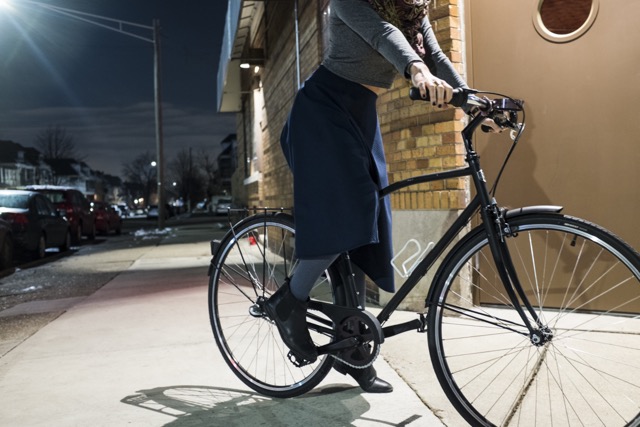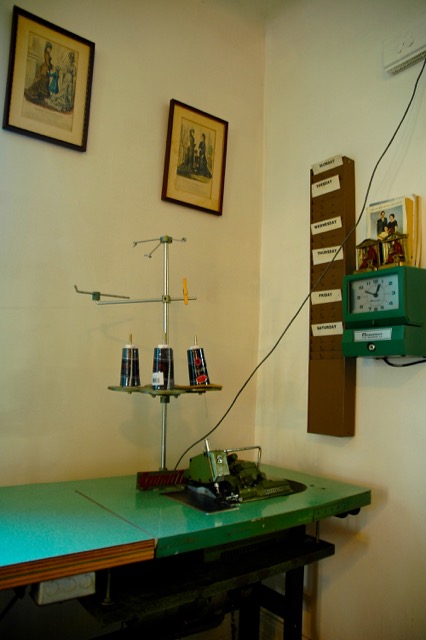Garment designer Sarah Ayers adds some chic to Detroit's grit
Mickey Lyons |
Friday, July 29, 2016
A typical day for Sarah Ayers will include any or all of the following: wig tape, Spanish music video shoots, bicycle rides, lunch with the staff of John Varvatos downtown, phone calls with United States military contractors, more phone calls with bicycle shop owners in Detroit and New York. As the proprietor of William and Bonnie—an alterations, tailoring, custom garments, and upholstery business—Ayers has built a unique career from a combination of old and new world skills.
William and Bonnie is only two years old, but in that time Ayers has created a niche for herself as Detroit's go-to seamstress and garment designer. From her home workshop in Hamtramck, she toils away using mid-century machinery, like a buttonholer, blind stitch machine, and mangler, so called because it has a reputation for flattening hands alongside the garments it's intended for.
This July, Ayers is pairing with Wheelhouse Detroit's Kelli Kavanaugh to launch a new clothing line geared towards cyclists, which will be sold exclusively at Wheelhouse's new Hamtramck store. The design was inspired by conversations with cyclists who need to make quick transitions from the road to the office.
Ayers set out to create what she calls "cycling gear that doesn't look like cycling gear": breathable, waterproof clothing that's also acceptable for an office environment. Eschewing the hyper-tight, spandex kits currently available, Ayers focuses instead on a simple yet playful look that appeals to riders who want comfort and convenience.
 "Cycling gear that doesn't look like cycling gear" - photo by Rosamaria Zamarron
"Cycling gear that doesn't look like cycling gear" - photo by Rosamaria Zamarron
Style is important to Ayers; it's not enough to be simply functional. "I'm a pretty strong minimalist," she says. "I like clean lines. Not to be super critical of cycling wear, but that's just not my aesthetic."
The line, previewed in December, includes snap-closure sundresses with pockets, and ponchos with cowls that extend over or under the helmet. Kavanaugh describes Ayers's designs as "chic and practical."
The clothing is made in Detroit, from entirely American-milled fabric—a rarity in the fashion industry. The enterprise also has the opportunity to be a showcase for Detroit makers' talents. "There's a lot of interest in Detroit, in terms of garments and manufacturing," says Ayers. "There's a real interest in bringing manufacturing to Detroit."
In order to foster that national relevance, Ayers is working to connect local fashion creatives—photographers, pattern makers, web designers, and other freelancers—to clients in an online forum. The project is still in its infancy, but she already has several collaborators.
"There's really not a group in the Detroit area that can do a one-stop shop," she says. "So I figured, I know a lot of people, why not connect them? It seemed very simple."
But, she insists, "I'm just the matchmaker."
By facilitating a community of like-minded people and nurturing growth for herself and others, she can help build the garment industry in Detroit beyond the small scale in which it's currently operating.
 Sewing machinery and punch clock
That same puzzle-solving mentality also leads to carefully calculated long-term projections. Each season over the next two years, Ayers plans to roll out a new fashion line for William and Bonnie. In late June, she raised modest funds through a Kiva campaign
Sewing machinery and punch clock
That same puzzle-solving mentality also leads to carefully calculated long-term projections. Each season over the next two years, Ayers plans to roll out a new fashion line for William and Bonnie. In late June, she raised modest funds through a Kiva campaign to rent commercial space and buy an industrial-sized sewing machine. The campaign was successfully funded within a week.
Ayers is clearly drawn to the traditional, whether it's in the tools she uses or the antiques she collects and displays in her workshop (she keeps track of her hours using a punch clock). The name of her business, too, is passed on—William is the name of her father, and Bonnie, her aunt, who encouraged her efforts early on.
"Those are very traditional names, and this kind of work runs along those same lines," she says. "There's a certain romance to it since it's not something many do anymore. It's from a bygone era that I find very charming."